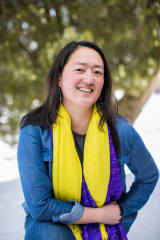Top 10 Reasons to Study Arabic
“Language is the road map of a culture. It tells you where its people come from and where they are going,” said Rita Mae Brown American writer, feminist, and activist. Learning another language can open doors and take you down twisting and turning paths you might never have expected to take before. In a fast-paced, constantly changing hyper-connected world, we rely on many forms of communication to create connections and build understanding between groups. Foreign language learning can allow for unique opportunities for both personal and professional growth, so, for aspiring language students, choosing the right one to invest your time in -- to learn and develop both written and conversational skills -- is an important decision. Arabic is a fascinating, complex language with a rich history and beautiful script, and it's definitely worth consideration as a field of study!
- Education

“Arabic is a very rich language; it has different dialects and different calligraphic forms and styles,” says Hasan Al Naboodah, an Emirati historian and dean of the College of Humanities and Social Sciences at UAE University, in an interview about the Arabic language’s origins. “Its history is as complex as the history of the countries that use the language.” Arabic -- a Semitic language with its origins in the 1st and 4th centuries CE, with similarities to the ancient languages of Hebrew, Aramaic and Phoenician -- is today the lingua franca of the Arab world and around 400 million people speak it. Modern Arabic is the primary language in four major distinct regional dialects, including the Arabic of the Maghreb (North Africa), Egyptian Arabic (Egypt and Sudan), Levantine Arabic (Lebanon, Syria, Jordan, and Palestine), and Iraqi/Gulf Arabic.
Courses for learning Arabic are available at colleges and universities and through online courses around the world. In 1973, Arabic became the sixth official working language of the General Assembly of the United Nations and its main commissions (the others being Chinese, English, French, Russian and Spanish). There is an abundance of reasons why you might consider enrolling in an Arabic language course right away, but here are the top ten you should consider. Studying Arabic could be the best decision you ever make!
1. Arabic speakers are in high demand
If you are fluent in Arabic, or have achieved a level of advanced competency in reading, writing, and conversational skills, you will be in high demand for the great amount of jobs and opportunities in the world for which Arabic is an essential requirement. In many countries, Arabic is the primary language of business and commerce. Having Arabic on your resume as one of the skills that could push your application to the top of the pile. The United Language Group explains, “With the competitive salaries and positions available to fluent speakers, Arabic will become an invaluable skill for any job seeker. While the push for Arabic language education in the Western world might take some time, the pieces are in place for the supply to meet the enormous global demand.”
2. Arabic is spoken in many countries
Additionally, The United Language Group reports that, “Arabic is the official language of over 20 countries, and has nearly 300 million native speakers. Economically, these countries have grown quickly in a short amount of time, and the Arab world has a combined GDP of $2.5 trillion.” So studying Arabic will open up opportunities to travel, work, and explore in all of these Arabic speaking countries.
For example, Justin Ford enrolled in Boston University’s World Languages and Literatures program, which took him on a study abroad experience in Morocco. He says, “I think [the program] really was integral to studying the language as a minor. Without studying abroad somewhere in the Arab world, whether it be in North Africa or the Levant region or the Gulf etc. you just won’t get the same kind of experience or understanding of the language or culture in class unless you experience it first hand on your own.”
3. It’s essential to understanding the world's second-largest religion, Islam
Language, culture, and religion are intimately linked together -- it’s almost like one cannot be understood without the other. “Islam is the second largest religion in the world, and the first largest religion in the Arab world. Islam is not only a religion to many Arabs, but also a lifestyle. When studying Arabic, you are not only learning a language but you also gain insight about Islamic beliefs and traditions,” writes TheArabAcademy.com. If you are interested in learning and understanding more about Islam, then studying Arabic is your gateway into a better understanding of this complex and intriguing religion
4. Arabic can connect you to a rich history and another civilization
“Linguistic evidence seems to point to an origin of the Semitic languages somewhere between the Fertile Crescent [an area that spanned the top of the Arabian Peninsula from Egypt to Syria and Kuwait] and the Arabian Peninsula,” says Stephan Guth, professor of Arabic language and Middle Eastern literatures at the University of Oslo, in a recent interview with The National. A language with such fascinating ancient origins is bound to offer students of the language access to a whole other world, with a rich history and foundations in another civilization and another time.
Even the history of the Arabic alphabet -- 18 shapes that express 28 phonetic sounds with the help of diacritical marks -- could take you on a journey through time and space to “the writing of the semi-nomadic Nabataean tribes, who inhabited southern Syria and Jordan, Northern Arabia, and the Sinai Peninsula. Surviving stone inscriptions in the Nabataean script show strong similarities to the modern Arabic writing system,” according to the Met Museum.
5. Studying Arabic will offer you a more nuanced understanding of Arab culture
Learning a language allows you to also delve deeper into the culture and traditions of the country or countries where that language is spoken. Studying Arabic will give you greater access into understanding more of the nuances and intricacies of Arab culture, which is often misunderstood and misrepresented through Western cultural lenses. How can we fight stereotypes and surface-level interactions? Learning a language is a powerful way to fight ignorance of places and people.
Arab culture is rich and interesting. Learning the language will enable you to read some of the famous classic literature. If you are a fan of Aladdin, Ali Baba, and Sindbad the Sailor, imagine reading the many stories in The One Thousand and One Nights (Alf laylah wa laylah) or the poems of Ḥāfeẓ and Ahmad Shawqi in their original versions. You’ll also gain a more in-depth and better understanding of Arab history with its complexities and knowledge of how “one tongue, many people” has been put into practice over millennia.
6. Travel will be easier in Arabic speaking countries
If you are someone who enjoys traveling off the beaten path, someone who always has itchy feet, or unquenchable wanderlust, then you will definitely want to consider studying Arabic. Travel will be much easier in Arab countries if you speak, read, and write Arabic. As the official language in 20 countries, you’ll gain access and be able to better interact with people in these countries if you know at least basic Arabic -- and experience true 'Arab hospitality'. Once a native speaker of Arabic hears a foreigner speak a few words in Arabic, they are usually very eager and happy to help you learn their language.
7. You’ll promote intercultural understanding
If you are fortunate enough to travel or study abroad in an Arabic-speaking country, by just being a foreigner, you will become an ambassador and begin to promote intercultural understanding. The Language Centre at Warwick University asserts, “In addition to having limited exposure to real Arabic culture, Westerners are presented with one-dimensional negative stereotypes of Arabic-speaking people through the news media, Hollywood films, and other sources. At the same time, events in the Middle East affect our daily lives. Reliance on such false and superficial images can lead to mistrust and miscommunication, to an inability to cooperate, negotiate, and compromise, and perhaps even to military confrontation. Those who learn Arabic gain deeper insights into the cultural, political, and religious values that motivate people in those cultures.”
Joe Hilleary, a student at Bowdoin College and founder of a new Arabic student-run club, says, “[It] is a really vibrant and dynamic part of the world. Oftentimes, the only coverage we see is very sad or violent [or] tragic. And that’s really an image we want to dispel, through getting people to engage with other aspects [of Arabic culture].” As a student of Arabic, you’ll be poised to start social justice action and better intercultural understanding, both locally and globally.
8. Arabic can help you understand other languages easily
Not surprisingly, the Arabic language is related to other world languages and knowing Arabic will grant you an easier time learning other languages such as Farsi or Persian, Turkish, Urdu, and Hebrew. A majority of the lexicon for these languages are similar or from the same root as Arabic words. The grammatical constructions and the semantics between these languages are similar. One video showcasing the similarities between Hebrew and Arabic went viral on the internet. As a prospective student of Arabic, you can rest assured you are making a good investment in your future by learning Arabic because it will also grant you flexibility and access to other languages.
9. Knowledge of Arabic will give you access to a growing market and jobs
“Given that less than 1 percent of US college students study Arabic, just 32,000 out of 21 million total students, Arabic language skills will separate you from the crowd, no matter your professional field,” reports Cameron Bean for American Councils for Higher Education. Speaking, writing, and reading Arabic could very well help you gain a position at a company or organization in a growing and evolving job market.
With a GDP of over 600 billion dollars annually, the Arab region also has much to offer the world market. “The Arab countries are in the process of reforming and diversifying their economies. Business regulation is improved in order to make the economies more competitive and to attract entrepreneurs. In the Arabian Gulf, for example, huge investments are made in areas like construction, finance, telecom and tourism,” Warwick University adds. Tapping into these markets, gaining a foothold in business, research and development, or any type of cutting-edge industry, will require speaking Arabic.
10. Arabic speakers make good salaries
Finally, as an Arabic language savant, you can expect to earn a higher than average salary. Katie Russell writes in The Daily Telegraph that in 2016 roughly 20 percent of employers said Arabic was a useful language to them, which rose to 26 percent in 2017. Today, Arabic remains a high-demand language skill that can gross a high annual salary. For example, Indeed.com reports that an Arabic foreign language instructor can start at between $69,000 and $112,000 per year. Possible jobs for Arabic speakers include (but are in no way limited to) language instructors, translators, interpreters, lecturers, and bilingual business and commerce employees.
Speaking a second language, not only opens new doors but also has numerous other advantages. You will gain valuable insight into another culture and access to another world.
Perhaps Nelson Mandela said it best: “If you talk to a man in a language he understands, that goes to his head. If you talk to him in his own language, that goes to his heart.” Arabic is one of the most coveted language skills, so open the door that’s been waiting for you...
Find your perfect program
Use our search to find and compare programs from universities all over the world!
Arabic
S.M. Audsley
Author
S. M. Audsley is a freelance writer and poet who lives and works in Vermont, a small but mighty state in the United States. She is an avid outdoor enthusiast and a lover of potlucks.
Find a program in these categories


